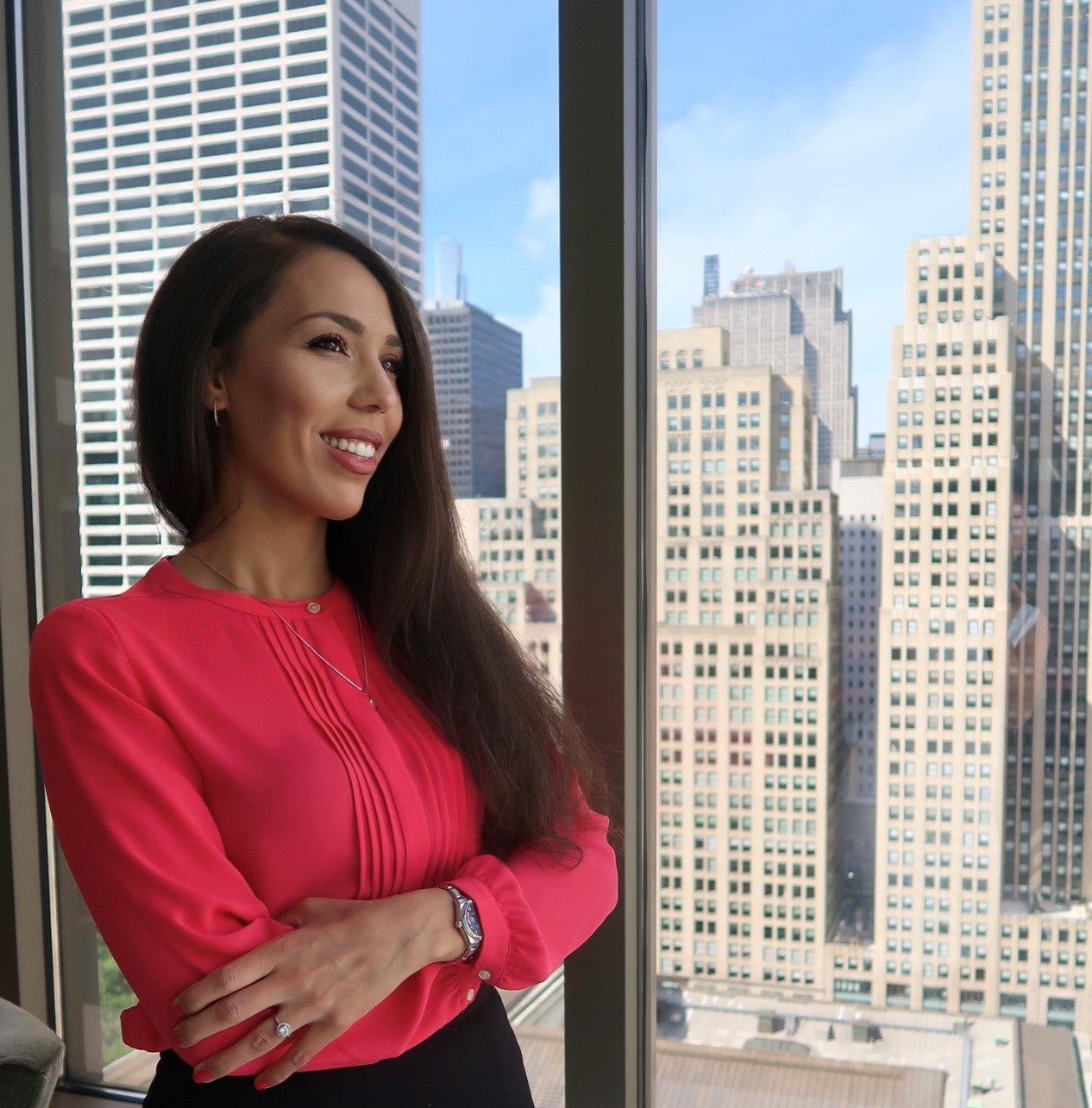Law alumna Mounia Benabdallah (37) grew up in Amsterdam-West and is now a partner at Baker McKenzie in New York. „The experience of growing up in two cultures and speaking two or more languages provides you with a particular cultural sensitivity that you can put to good use in international practice."
What exactly do you do at Baker McKenzie?
„I specialise in international tax law and I promote ‘the Netherlands Ltd.’, in a manner of speaking. In practice, this has to do with the large foreign companies that often want to start up or expand in Europe, with their headquarters located in the Netherlands. As a lawyer, I help them to achieve this. The Netherlands is a good candidate for these companies, not only with respect to taxes, but also because of the existing knowledge, the open economy and the infrastructure."
„As a small country, we rely on foreign countries to create jobs in the Netherlands. Contributing to the economy in some way feels great, and it’s good to know, for example, that in five years’ time there will be 50 people who have a job with a specific company that isn’t active in the Netherlands yet."
„People have been saying to me since I was young that I should become a lawyer."
How did you come to choose law for your studies?
„People have been saying to me since I was young that I should become a lawyer. I loved helping people deal with legal matters such as lodging objections. Law really appealed to me. During my studies, it sometimes bothered me that law seemed to attract students who didn’t really know what they wanted to do with their lives, while I had consciously chosen to be there."
„When I undertook a master’s in tax law, I deliberately chose that niche area too. I’d missed working with figures during my undergraduate degree, and the small scale of this master’s programme also appealed to me. The class was a small group of highly motivated students. There were a few older students, some of whom had worked in the Tax Department for years. I felt like a total rookie in comparison, and decided to make up for this perceived shortfall in practical experience by getting my first student job at Ernst & Young."
„However, that lack of diversity isn’t necessarily to do with not wanting to accept others who are different. People simply feel more comfortable when they can identify with others around them."
And then you ended up at Baker McKenzie at the age of 22. Did you feel at home there right away?
„Naturally the environment feels very new when you’re starting out. That was especially the case for me, but it didn’t bother me too much. Instead, I immersed myself in the content and the professional aspect. The Zuidas wasn’t the foremost bastion of multicultural diversity in Amsterdam at the time, of course. However, that lack of diversity isn’t necessarily to do with not wanting to accept others who are different. People simply feel more comfortable when they can identify with others around them. If you come from the same neighbourhood, studied at the same university or were in the same student organisation together, it’s much easier to reach out."
In your experience, do Amsterdam and New York differ from each other in this respect?
„New York is much larger, of course. There are almost no homogeneous groups. People come from all over the world to work here. There is still a kind of class difference though, with a large gap between the ‘upper’ and ‘lower’ class. It’s an expensive city, and not everyone can afford to live here in the same way."
„Instead of denying who you are or where you come from, use it as a source of strength."
In what way do you use your experiences to help others?
„I regularly receive invitations to speak to a student group, or get an email from someone in my former network. I almost always have the same message for them: try and figure out what you want to do in good time. If you wait for others to tell you what you’re good at, you’ll never get anywhere."
„When it comes to young people from multicultural backgrounds, I also say: be proud. Instead of denying who you are or where you come from, use it as a source of strength. You can make very good use of a multicultural background in an international work environment. The experience of growing up in two cultures and speaking two or more languages provides you with a particular cultural sensitivity that you can put to good use in international practice."
„I was heavily pregnant with my second child when I went through the partner process. My approach was: okay, the circumstances aren’t ideal, but let’s just give it a try."
„Work on your story, and don’t sell yourself short. Whether it’s about being a woman or having a multicultural background, it’s often just the way you present something that matters. For example, consider the term ‘expat’ – it sounds very fancy compared to the term ‘immigrant’. But what’s the difference? The parents were often initially expats of a sort as well. Though they may not have come from the wealthiest country, it doesn’t change that fact. They shared the same ambition. And then there are refugees, who are often even more motivated to make something of their lives in their new home country."
You became a partner at Baker McKenzie at the age of 31 – one of the youngest women in that position. Does that also align with the theme of wanting to prove yourself?
„I think so. I was heavily pregnant with my second child when I went through the partner process. My approach was: okay, the circumstances aren’t ideal, but let’s just give it a try. That attitude has always helped me. It’s such a shame to make a decision ahead of time, based on a potentially negative outcome. After all, things could turn out well too, surely? And if it doesn’t work out this time, then I’m also okay with that. I’ll just try again next time."








